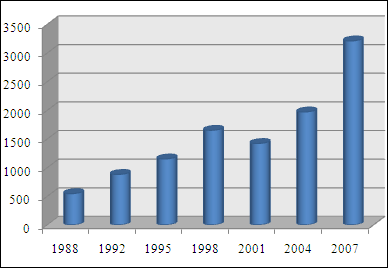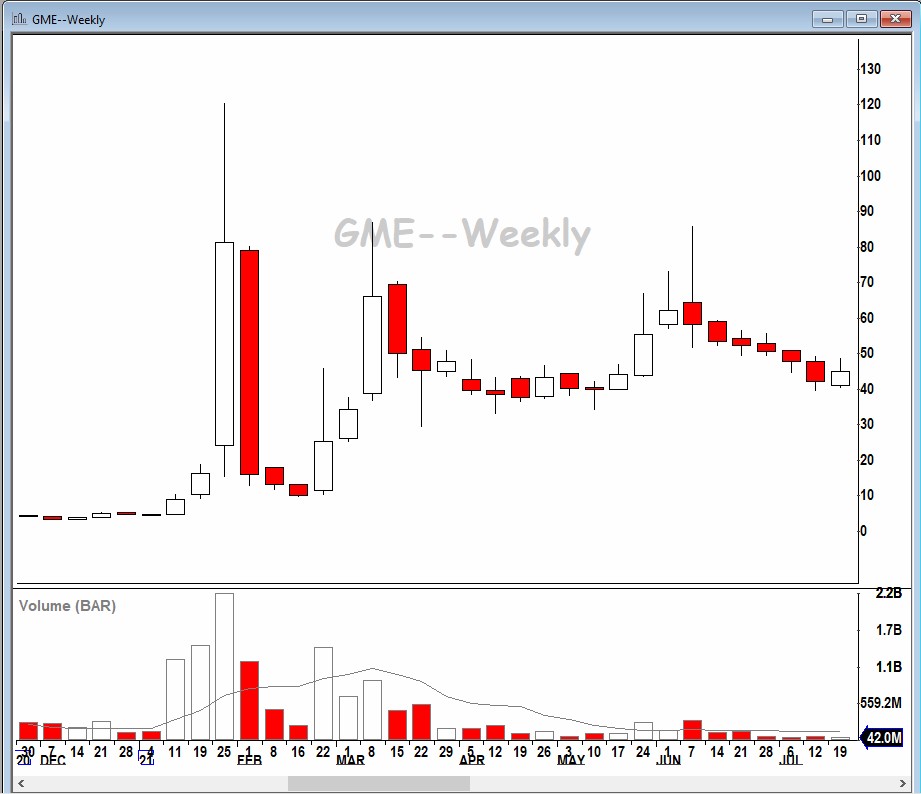|
Retail Foreign Exchange Trading
Retail foreign exchange trading is a small segment of the larger foreign exchange market where individuals speculate on the exchange rate between different currencies. This segment has developed with the advent of dedicated electronic trading platforms and the internet, which allows individuals to access the global currency markets. , it was reported that retail foreign exchange trading represented 5.5% of the whole foreign exchange market ($282 billion in daily trading turnover).Triennial Central Bank Survey (April 2016), Bank for International Settlements Prior to the development of forex trading platforms in the late 1990s, forex trading was restricted to large financial institutions. It was the development of the internet, trading software, and forex brokers allowing trading on |
Foreign Exchange Market
The foreign exchange market (forex, FX, or currency market) is a global decentralized or over-the-counter (OTC) market for the trading of currencies. This market determines foreign exchange rates for every currency. By trading volume, it is by far the largest market in the world, followed by the credit market. The main participants are the larger international banks. Financial centres function as anchors of trading between a range of multiple types of buyers and sellers around the clock, with the exception of weekends. As currencies are always traded in pairs, the market does not set a currency's absolute value, but rather determines its relative value by setting the market price of one currency if paid for with another. Example: 1 USD is worth 1.1 Euros or 1.2 Swiss Francs etc. The market works through financial institutions and operates on several levels. Behind the scenes, banks turn to a smaller number of financial firms known as "dealers", who are involve ... [...More Info...] [...Related Items...] OR: [Wikipedia] [Google] [Baidu] |
Mrs Watanabe
Mrs. Watanabe, also known as Kimono Trader, is a term that gained prominence in the early 2000s, representing a stereotype associated with Japanese retail currency-market traders. These individuals became notable for their active participation in currency trading (Forex), which had a significant impact on global currency markets and garnered attention on a worldwide scale. The term ''Mrs. Watanabe'' was used as early as the 1980s, although a 1997 reference in ''The Economist'' became well known. is a common surname in Japan, but not the most common.''Watanabe'' is the 6th common surname, see :ja:姓#日本_2. Despite the " Mrs." honorific, about 85% of the retail currency traders in Japan as of 2019 are male, mostly in their 30s, 40s and 50s. Gearoid Reidy of Bloomberg News concluded after research that "Mrs. Watanabe"'s meaning changed over time from a Japanese equivalent of Joe Sixpack or Joe Bloggs to specifically referring to FX traders. Due to the low interest rates in J ... [...More Info...] [...Related Items...] OR: [Wikipedia] [Google] [Baidu] |
Online Brokerages
In computer technology and telecommunications, online indicates a state of connectivity, and offline indicates a disconnected state. In modern terminology, this usually refers to an Internet connection, but (especially when expressed as "on line" or "on the line") could refer to any piece of equipment or functional unit that is connected to a larger system. Being online means that the equipment or subsystem is connected, or that it is ready for use. "Online" has come to describe activities and concepts that take place on the Internet, such as online identity, online predator and online shop. A similar meaning is also given by the prefixes cyber and e, as in words ''cyberspace'', ''cybercrime'', ''email'', and ''e-commerce''. In contrast, "offline" can refer to either computing activities performed while disconnected from the Internet, or alternatives to Internet activities (such as shopping in brick-and-mortar stores). The term "offline" is sometimes used interchangeably with ... [...More Info...] [...Related Items...] OR: [Wikipedia] [Google] [Baidu] |
Foreign Exchange Market
The foreign exchange market (forex, FX, or currency market) is a global decentralized or over-the-counter (OTC) market for the trading of currencies. This market determines foreign exchange rates for every currency. By trading volume, it is by far the largest market in the world, followed by the credit market. The main participants are the larger international banks. Financial centres function as anchors of trading between a range of multiple types of buyers and sellers around the clock, with the exception of weekends. As currencies are always traded in pairs, the market does not set a currency's absolute value, but rather determines its relative value by setting the market price of one currency if paid for with another. Example: 1 USD is worth 1.1 Euros or 1.2 Swiss Francs etc. The market works through financial institutions and operates on several levels. Behind the scenes, banks turn to a smaller number of financial firms known as "dealers", who are involve ... [...More Info...] [...Related Items...] OR: [Wikipedia] [Google] [Baidu] |
:Category:Foreign Exchange Companies
{{Portal, Companies This category is for foreign exchange company A non-bank foreign exchange company also known as foreign exchange broker or simply forex broker is a company that offers currency exchange and international payments to private individuals and companies. The term is typically used for currency ex ..., or forex, companies. Financial services companies by type Foreign exchange market ... [...More Info...] [...Related Items...] OR: [Wikipedia] [Google] [Baidu] |
Scalping (trading)
Scalping, when used in reference to trading in securities, commodities and foreign exchange, may refer to either # a legitimate method of arbitrage of small price gaps created by the bid–ask spread, or # a fraudulent form of market manipulation. Arbitrage Scalping, in the arbitrage sense, is a type of trading in which traders try to open and close positions in very short periods of time in markets such as foreign exchange and securities with the aim of making a small profit from the trades. Adding more onto scalping is a trading strategy where traders make small profits by quickly buying and selling. It’s popular in markets like foreign exchange and stocks, where traders take advantage of tiny price changes or bid-ask spreads. Traders usually start scalping whenever they are down money and start basically gambling to make money they put in 1:1 risk ratio. How scalping works Scalping is the shortest time frame in trading and it exploits small changes in currency price ... [...More Info...] [...Related Items...] OR: [Wikipedia] [Google] [Baidu] |
Day Trader
Day trading is a form of speculation in securities in which a trader buys and sells a financial instrument within the same trading day. This means that that all positions are closed before the market closes for the trading day to avoid unmanageable risks and negative price gaps between one day's close and the next day's price at the open. Traders who trade in this capacity are generally classified as speculators. Day trading contrasts with the long-term trades underlying buy-and-hold and value investing strategies. Day trading may require fast trade execution, sometimes as fast as milli-seconds in scalping, therefore direct-access day trading software is often needed. Day trading is a strategy of buying and selling securities within the same trading day. According to FINRA, a "day trade" involves the purchase and sale (or sale and purchase) of the same security on the same day in a margin account, covering a range of securities including options. An individual is considered ... [...More Info...] [...Related Items...] OR: [Wikipedia] [Google] [Baidu] |
Broker
A broker is a person or entity that arranges transactions between a buyer and a seller. This may be done for a commission when the deal is executed. A broker who also acts as a seller or as a buyer becomes a principal party to the deal. Neither role should be confused with that of an agent—one who acts on behalf of a principal party in a deal. Definition A broker is an independent party whose services are used extensively in some industries. A broker's prime responsibility is to bring sellers and buyers together and thus a broker is the third-person facilitator between a buyer and a seller. An example would be a real estate broker who facilitates the sale of a property. Brokers can furnish market research and market data. Brokers may represent either the seller or the buyer but generally not both at the same time. Brokers are expected to have the tools and resources to reach the largest possible base of buyers and sellers. They then screen these potential buyers or sellers f ... [...More Info...] [...Related Items...] OR: [Wikipedia] [Google] [Baidu] |
Financial Regulators
Financial regulation is a broad set of policies that apply to the financial sector in most jurisdictions, justified by two main features of finance: systemic risk, which implies that the failure of financial firms involves public interest considerations; and information asymmetry, which justifies curbs on freedom of contract in selected areas of financial services, particularly those that involve retail clients and/or principal–agent problems. An integral part of financial regulation is the supervision of designated financial firms and markets by specialized authorities such as securities commissions and bank supervisors. In some jurisdictions, certain aspects of financial supervision are delegated to self-regulatory organizations. Financial regulation forms one of three legal categories which constitutes the content of financial law, the other two being market practices and case law. History In the early modern period, the Dutch were the pioneers in financial regulation. ... [...More Info...] [...Related Items...] OR: [Wikipedia] [Google] [Baidu] |
The Wall Street Journal
''The Wall Street Journal'' (''WSJ''), also referred to simply as the ''Journal,'' is an American newspaper based in New York City. The newspaper provides extensive coverage of news, especially business and finance. It operates on a subscription model, requiring readers to pay for access to most of its articles and content. The ''Journal'' is published six days a week by Dow Jones & Company, a division of News Corp. As of 2023, ''The'' ''Wall Street Journal'' is the List of newspapers in the United States, largest newspaper in the United States by print circulation, with 609,650 print subscribers. It has 3.17 million digital subscribers, the second-most in the nation after ''The New York Times''. The newspaper is one of the United States' Newspaper of record, newspapers of record. The first issue of the newspaper was published on July 8, 1889. The Editorial board at The Wall Street Journal, editorial page of the ''Journal'' is typically center-right in its positio ... [...More Info...] [...Related Items...] OR: [Wikipedia] [Google] [Baidu] |
Foreign Exchange Fraud
Foreign exchange fraud is any trading scheme used to defraud traders by convincing them that they can expect to gain a high profit by trading in the foreign exchange market. Currency trading became a common form of fraud in early 2008, according to Michael Dunn of the U.S. Commodity Futures Trading Commission. The foreign exchange market is at best a zero-sum game, meaning that whatever one trader gains, another loses. However, brokerage commissions and other transaction costs are subtracted from the results of all traders, making foreign exchange a negative-sum game. US government interventions In August 2008, the CFTC set up a special task force to deal with growing foreign exchange fraud. In January 2010, the CFTC proposed new rules limiting leverage to 10 to 1, based on "a number of improper practices" in the retail foreign exchange market, "among them solicitation fraud, a lack of transparency in the pricing and execution of transactions, unresponsiveness to customer complai ... [...More Info...] [...Related Items...] OR: [Wikipedia] [Google] [Baidu] |
Australian Securities & Investments Commission
The Australian Securities and Investments Commission (ASIC) is an independent commission of the Australian Government tasked as the national corporate regulator. ASIC's role is to regulate company and financial services and enforce laws to protect Australian consumers, investors and creditors. ASIC, which reports to the treasurer, was established on 1 July 1998 following recommendations from the Wallis Inquiry. Areas of responsibility ASIC's authority and scope are determined by the ''Australian Securities and Investments Commission Act 2001''. ASIC's areas of responsibility include: *corporate governance *financial services *securities and derivatives *insurance *consumer protection *financial literacy ASIC's consumer websitwww.moneysmart.gov.auwas launched on 15 March 2011. MoneySmart replaced ASIC's two previous consumer websites, FIDO and Understanding Money. MoneySmart aims to help people make good financial decisions by providing free, independent and unbiased inform ... [...More Info...] [...Related Items...] OR: [Wikipedia] [Google] [Baidu] |





